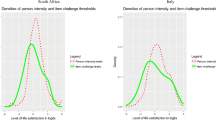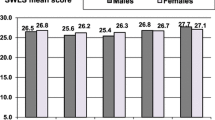Abstract
The Satisfaction With Life Scale (SWLS) is one of the most widely used scales for the measurement of subjective well-being across the globe, but no satisfactory version exists for use among Malay-speaking populations. The present study reports on the translation of a new Malay SWLS and examines its psychometric properties in a community sample of 816 Malay and 738 Chinese participants from Malaysia. Results showed that the Malay SWLS had good internal consistency (Cronbach’s α = 0.83). Confirmatory factor analysis showed support for a unidimensional factor structure which remained invariant across sex and ethnic group. These results suggest that the Malay SWLS is a valid and reliable measure of life satisfaction for Malay-speaking samples, and extends the list of available scales for measuring subjective well-being among such groups.

Similar content being viewed by others
References
Akaike, H. (1973). Information theory and an extension of the maximum likelihood principle. In B. N. Petrov & F. Csaki (Eds.), Proceedings of the Second International Symposium on Information Theory (pp. 267–281). Budapest: Akademiai Kiado.
Andrews, F. M., & Robinson, J. P. (1991). Measures of subjective well-being. In J. P. Robinson, P. R. Shaver & L. Wrightsman (Eds.), Measures of personality and social psychological attitudes: Measures of social psychological attitudes (Vol. 1, pp. 61–114). San Diego, CA: Academic Press.
Arbuckle, J., & Wothke, W. (1999). AMOS 4 user’s reference guide. Chicago, IL: Smallwaters Corporation.
Arrindell, W. A., Heesink, J., & Feij, J. A. (1999). The Satisfaction With Life Scale (SWLS): Appraisal with 1700 healthy young adults in the Netherlands. Personality and Individual Differences, 26, 815–826.
Atienza, F. L., Balaguer, I., & García-Merita, M. (2003). Satisfaction With Life Scale: Analysis of factorial invariance across sexes. Personality and Individual Differences, 35, 1255–1260.
Balatsky, G., & Diener, E. (1993). A comparison of the well-being of Soviet and American students. Social Indicators Research, 28, 225–243.
Bentler, P. M. (1990). Comparative fit indexes in structural models. Psychological Bulletin, 107, 238–246.
Blais, M. R., Vallerand, R. J., Pelletier, L. G., & Brière, N. M. (1989). L’Échelle de satisfaction de vie: Validation canadienne-franc¸ aise du ‘Satisfaction with Life Scale’’ [The satisfaction scale: Canadian-French validation of the Satisfaction with Life Scale]. Canadian Journal of Behavioural Science, 21, 210–223.
Bollen, K. A. (1989). Structural equations with latent variables. New York, NY: Wiley.
Breslin, R. W. (1970). Back-translation for cross-cultural research. Cross-Cultural Psychology, 1, 185–216.
Browne, M. W., & Cudeck, R. (1993). Alternative ways of assessing model fit. In K. A. Bollen & J. S. Long (Eds.), Testing structural equation models (pp. 136–162). Newbury Park, CA: Sage.
Byrne, B. (2001). Structural equation modeling using AMOS: Basic concepts, applications, and programming. Mahwah, NJ: Lawrence Erlbaum Associates.
Chua, B. S., & Abdul, H. O. (2001). The influence of ethnicity, gender, personality, life satisfaction, and number of children in the family on child abuse potential. Hong Kong Journal of Paediatry, 6, 40–43.
Diener, E., Emmons, R. A., Larsen, R. J., & Griffin, S. (1985). The satisfaction with life scale. Journal of Personality Assessment, 49, 71–75.
Diener, E., Oishi, S., & Lucas, R. E. (2003). Personality, culture, and subjective well-being: Emotional and cognitive evaluations of life. Annual Review of Psychology, 54, 403–425.
Gilman, R., & Huebner, E. S. (2001). Review of life satisfaction measures for adolescents. Behaviour Change, 17, 178–195.
Gouveia, V. V., Milfont, T. L., Nunes da Fonseca, P., & Peçanha de Miranda Coelho, J. A. (in press). Life satisfaction in Brazil: Testing the psychometric properties of the Satisfaction With Life Scale (SWLS) in five Brazilian samples. Social Indicators Research.
Heckathorn, D. D. (1997). Respondent-driven sampling: A new approach to the study of hidden populations. Social Problems, 44, 174–199.
Hoelter, J. W. (1983). The analysis of covariance structures: Goodness-of-fit indices. Sociological Methods and Research, 11, 325–344.
Howell, C. J., Howell, R. T., & Schwabe, K. A. (2006). Does wealth enhance life satisfaction for people who are materially deprived? Exploring the association among the Orang Asli of Peninsular Malaysia. Social Indicators Research, 76, 499–524.
Hu, L.-T., & Bentler, P. M. (1995). Evaluating model fit. In R. H. Hoyle (Ed.), Structural equation modeling: Concepts, issues, and applications (pp. 76–99). Thousand Oaks, CA: Sage.
Hu, L.-T., & Bentler, P. M. (1998). Fit indices in covariance structure modeling: Sensitivity to underparameterized model misspecification. Psychological Methods, 3, 424–453.
Hultell, D., & Gustavsson, J. P. (2008). A psychometric evaluation of the Satisfaction with Life Scale in a Swedish nationwide sample of university students. Personality and Individual Differences, 44, 1070–1079.
Lewis, C. A., Shevlin, M. E., Smekal, V., & Dorahy, M. J. (1999). Factor structure and reliability of a Czech translation of the Satisfaction With Life Scale among Czech university students. Studia Psychologica, 41, 239–244.
McDonald, R. P. (1999). Test theory: A unified treatment. Mahwah, NJ: Lawrence Erlbaum Associates.
Mulaik, S. A., James, L. R., van Alstine, J., Bennett, N., Lind, S., & Stilwell, C. D. (1989). Evaluation of goodness-of-fit indices for structural equation models. Psychological Bulletin, 105, 430–445.
Neto, F. (1993). The satisfaction with life scale: Psychometrics properties in an adolescent sample. Journal of Youth and Adolescence, 22, 125–134.
Nettle, D. (2005). Happiness: The science behind your smile. Oxford: Oxford University Press.
Oishi, S. (2002). The experiencing and remembering of well-being: A cross-cultural analysis. Personality and Social Psychology Bulletin, 28, 1398–1406.
Oishi, S. (2006). The concept of life satisfaction across cultures: An IRT analysis. Journal of Research in Personality, 40, 411–423.
Oishi, S., & Diener, E. (2001). Goals, culture, and subjective well-being. Personality and Social Psychology Bulletin, 27, 1674–1682.
Oishi, S., & Diener, E. (2003). Culture and well-being: The cycle of action, evaluation and decision. Personality and Social Psychology Bulletin, 29, 939–949.
Pavot, W., & Diener, E. (1993). Review of the satisfaction with life scale. Psychological Assessment, 5, 164–172.
Pavot, W., & Diener, E. (2008). The Satisfaction With Life Scale and the emerging construct of life satisfaction. Journal of Positive Psychology, 3, 137–152.
Pavot, W., Diener, E., Colvin, C. R., & Sandvik, E. (1991). Further validation of the satisfaction with life scale: Evidence for the cross-method convergence of well-being measures. Journal of Personality Assessment, 57, 149–161.
Pons, D., Atienza, F. L., Balaguer, I., & Garcia-Merita, M. L. (2000). Satisfaction with life scale: Analysis of factorial invariance for adolescents and elderly persons. Perceptual and Motor Skills, 91, 62–68.
Pons, D., Atienza, F. L., Balaguer, I., & Garcia-Merita, M. L. (2002). Propiedades psicometricas de la Escala de Satisfacción con la Vida en personas de tercera edad [Psychometric properties of Satisfaction With Life Scale in the elderly]. Revista Iberoamericana de Diagnóstico y Evaluación Psicológica, 13, 71–82.
Sachs, J. (2004). Validation of the Satisfaction With Life Scale in a sample of Hong Kong University. Psychologia: An International Journal of Psychology in the Orient, 46, 225–234.
Shevlin, M. E., Brunsden, V., & Miles, J. N. V. (1998). Satisfaction with life scale: Analysis of factorial invariance, mean structures and reliability. Personality and Individual Differences, 25, 911–916.
Shevlin, M. E., & Bunting, B. P. (1994). Confirmatory factor analysis of the satisfaction with life scale. Perceptual and Motor Skills, 79, 1316–1318.
Swami, V. (in press). Translation and validation of the Malay Subjective Happiness Scale. Social Indicators Research.
Swami, V., & Chamorro-Premuzic, T. (in press). Factor structure of the Body Appreciation Scale among Malaysian women. Body Image.
Swami, V., Chamorro-Premuzic, T., Sinniah, D., Maniam, T., Kannan, K., Stanistreet, D., & Furnham, A. (2007). General health mediates the relationship between loneliness, life satisfaction and depression: A study with Malaysian medical students. Social Psychiatry and Psychiatric Epidemiology, 42, 161–166.
Swami, V., Sinniah, D., Subramaniam, P., Pillai, S. K., Kannan, K., & Chamorro-Premuzic, T. (2008). An exploration of the Indecisiveness Scale in multi-ethnic Malaysia. Journal of Cross-Cultural Psychology, 39, 309–316.
Tanaka, J. S., & Huba, G. J. (1985). A fit index for covariance structure models under arbitrary GLS estimation. British Journal of Mathematical and Statistical Psychology, 38, 197–201.
Vassar, M. (2008). A note on the score reliability for the Satisfaction With Life Scale: An RG study. Social Indicators Research, 86, 47–57.
Vittersø, J., Biswas-Diener, R., & Diener, E. (2005). The divergent meanings of life satisfaction: Item response modeling of the Satisfaction With Life Scale in Greenland and Norway. Social Indicators Research, 74, 327–348.
Wu, C. H., & Yao, G. (2006). Analysis of factorial invariance across gender in the Taiwan version of the Satisfaction with Life Scale. Personality and Individual Differences, 40, 1259–1268.
Ye, S. (2007). Validation of the temporal satisfaction with life scale in a sample of Chinese university students. Social Indicators Research, 80, 617–628.
Author information
Authors and Affiliations
Corresponding author
Rights and permissions
About this article
Cite this article
Swami, V., Chamorro-Premuzic, T. Psychometric Evaluation of the Malay Satisfaction With Life Scale. Soc Indic Res 92, 25–33 (2009). https://doi.org/10.1007/s11205-008-9295-7
Received:
Accepted:
Published:
Issue Date:
DOI: https://doi.org/10.1007/s11205-008-9295-7




